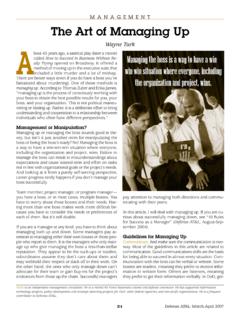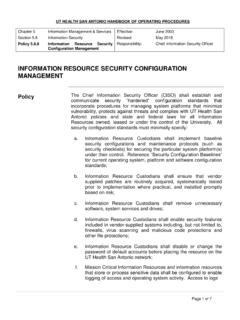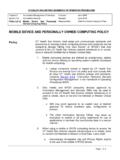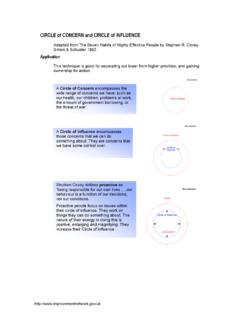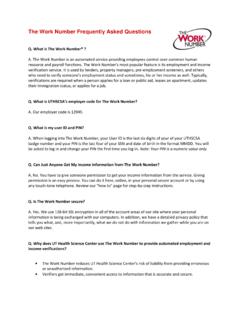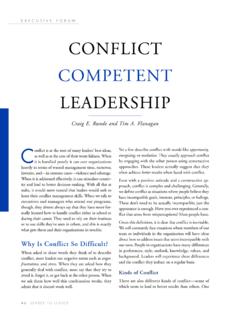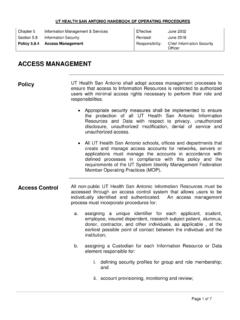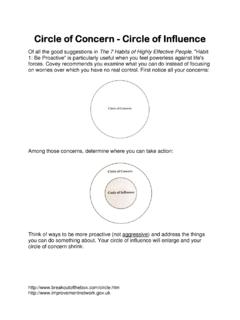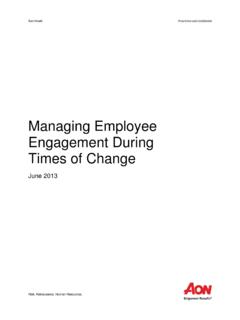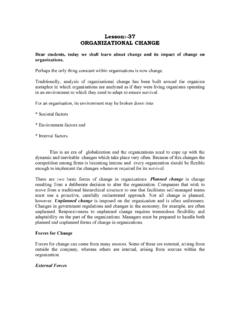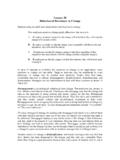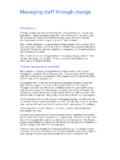Transcription of Chapter 3: Managing Conflict with Your Boss
1 Chapter 3: Managing Conflict with your boss Overview The special case of Conflict between a direct report and a boss presents unique challenges. As a manager with responsibilities up and down the organizational chain, recognizing and resolving conflicts with your boss may well define to what degree you can effectively contribute to your organization. A Conflict with your boss can arise from several different kinds of situations or opposing perspectives. Here are a few examples that illustrate potential roots of a Conflict : There is no role clarity or alignment. You are not sure about how your work supports your boss 's work and how it meets the mission of the organization. You may think you're doing tasks that should be on your boss 's list. your boss may think that she or he is doing too much of your work. The Look of Conflict An executive agrees to take on a new position with greater scope and more responsibility. Initially the boss had promised that a pay increase would go with the new position, but that was delayed due to budget shortfalls.
2 After a year the executive is becoming very frustrated and losing trust in her boss . Unfilled expectations cause many of the conflicts between direct reports and their bosses. Communication clear and often and open is one key to Managing and resolving those conflicts . You and the boss sit at different vantage points. Depending on the structure of your organization, each of you is accountable to a different measure of performance and to different stakeholders. You and your boss may not pay attention to or respond to the same things because you don't hold the same position in the organization. You lack confidence in your boss 's ability. Several different situations could lead you to this perspective. Perhaps you held the interim position prior to your boss 's appointment and then the organization asked you to orient your new boss to the job. Perhaps the skills your boss employs aren't as apparent to you as the skills you have to use to get results in your position.
3 your boss lacks confidence in you. your boss may be looking to you for information, advice, and options, but perceives you to be faltering on all fronts. You and your boss are mismatched in ethics, values, and integrity. Managing Conflict that threatens the organizational good because of mismatched ethics, values, or integrity may require you to seek advice and support from reliable internal HR resources or even external support sources (ranging from coaching to legal advice). My View of Conflict : A Personal Worksheet Take some time to consider the following list of questions. Answer them as completely and thoughtfully as you can. You may find it useful to record your answers so that you can return to them from time to time to see if your answers and your view toward Conflict have shifted. How do you define Conflict ? How do you think your definition of Conflict is similar to or different from how those around you define it? What experiences shaped your views and attitudes about Conflict ?
4 What directions related to handling Conflict were you given as a child? How would you describe your communication strategies when you feel uncomfortable or uneasy? (Think of such actions as raising your voice, withdrawing, making wisecracks, laughing, asking questions, and bombarding others with information.) What are the triggers that for you ignite a Conflict ? What are your own attitudes toward Conflict ? How do you behave toward your boss ? Are you engaging in any of the following behaviors? Political maneuvering. Don't go over your boss 's head when Conflict occurs. Include your boss when you go up the organizational ladder to address a problem. Don't start looking at your next position. Concentrate on the assignments your boss has given you. Lip service. All talk and no action is a sure way to increase Conflict with your boss . Tell your boss what you'll do and then do it. Loose talk. Don't undermine your boss ; it will come back to haunt you. Support your boss when dealing with peers, direct reports, and staff.
5 Apple-polishing. Don't go overboard. Understanding and supporting your boss 's point of view does not mean abandoning your own ideas or values. Nor should you withhold negative information. Determine when to raise issues in a public forum and when to take them behind closed doors. Disagree disagreeably. It's healthy to disagree, but don't carry the disagreement out of the meeting. Don't let it infect your relationships or prey on your mind. You and your boss are mismatched in some other regard. This mismatch can run the gamut from management styles to differences in philosophy, motivation, and personality. You may prefer a more directive approach to leadership, for example. You may prefer more structure, and more direction about how to accomplish goals. your boss may prefer a less directive approach and give his direct reports more freedom to do their work than you are accustomed to or are comfortable with . It's important to understand the circumstances under which conflicts between you and your boss can arise.
6 Understanding the context allows you to make a full examination of the Conflict so you can work toward a resolution. Before you can effectively manage a Conflict with your boss , however, you will need to examine your own definition of Conflict , your beliefs about Conflict , and your behavior during a Conflict situation. your goal is to understand your responses to specific situations, or "triggers," and your reactions, or "coping strategies," to those situations. Once you understand more clearly how different situations can cause Conflict , and how you interact with your boss when Conflict arises, you will have a clearer view of your own contribution to a Conflict situation. The next step in learning to manage Conflict with your boss is to investigate the expectations you and your boss have of each other. your boss 's expectations regarding performance and your own expectations regarding support and development can indicate a point of Conflict . If you can clarify those expectations you will be ready to develop strategies for bridging the gap in your working relationship.
7 Clarifying Expectations CCL has found that of all the factors important for success within an organization, there are four that your boss is likely to value most: resourcefulness, doing whatever it takes, being a quick study, and decisiveness. These four factors do the most to shape your boss 's evaluation of your performance and to define your boss 's expectations of your performance. If you are experiencing Conflict with your boss , part of that Conflict may stem from your failure to understand or meet your boss 's expectations in one or more of these key areas. Using the Performance Expectation Worksheet on pages 16 17, rate your performance related to each of the four factors CCL has found to be most influential in defining your boss 's expectations and evaluations. The Look of Conflict The director of the Employee Assistance Program (EAP) for a large telecommunications company operated successfully with much autonomy and authority. This program was popular and the director enjoyed his "loose" relationship with his boss .
8 However, a new boss was promoted to the supervisory position and Conflict between that boss and the director began. The new boss , eager to make his mark on his new organization, informed the EAP director that he would no longer be in charge of the program. The new boss put himself in charge, changing the director's role to that of an implementer of the program. Following a series of discussions (some heated), both parties defined what they wanted and expected of each other. This clarification convinced the new boss to restore the original authority to the director. Conflict between a manager and a boss can result from problems related to performance and from mismatches between personality and approaches (or style). When it comes to Managing Conflict related to performance, your first step is to define your boss 's perception of your performance. Performance Expectation Worksheet Darken the circle that best describes your own assessment of your performance.
9 After completing the worksheet, examine your answers. What do they say about your strengths and developmental needs? What effect do your strengths and developmental needs have on your behavior toward your boss ? Do you behave in ways that might spur Conflict , as a way to cover up a developmental need, or as a way to make yourself look better than your boss ? What do you think your boss expects of you in each of these areas? [Suggestion: Give a copy of this assessment to your boss for his or her feedback.] Resourcefulness I can think strategically under pressure I need to develop this skill. This is one of my strengths. I can set up complex work systems. I need to develop this skill. This is one of my strengths. I exhibit flexible problem-solving behavior. I need to develop this skill. This is one of my strengths. I work effectively with higher management in dealing with the complexities of the job. I need to develop this skill. This is one of my strengths.
10 Doing whatever it takes I show perseverance and focus in the face of obstacles. I need to develop this skill. This is one of my strengths. I can take charge. I need to develop this skill. This is one of my strengths. I can learn from others when necessary. I need to develop this skill. This is one of my strengths. Being a quick study I am able to master quickly new technical and business knowledge. I need to develop this skill. This is one of my strengths. Decisiveness I can make good decisions under pressure. I need to develop this skill. This is one of my strengths. I can make decisions and take action in a timely fashion. I need to develop this skill. This is one of my strengths. I follow through on decisions. I need to develop this skill. This is one of my strengths. If your boss 's evaluation doesn't agree with your opinion of yourself, Conflict is likely to occur. But finding out what your boss expects of you and understanding his or her perspective isn't so easy.
